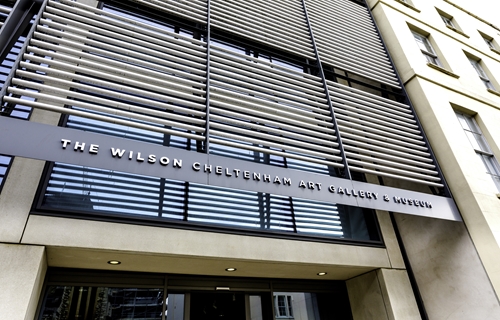Cheltenham’s cultural scene is alive with great options. All year round, you can make your way to the top gallery in Gloucestershire, as well as excellent museums including the birthplace of world-famous composer Gustav Holst. Plus, from spring through to autumn, there’s a jam-packed calendar of cultural events and festivals for you to feast on.
Culture in Cheltenham
Galleries
Just a hop, skip and a jump away from our Cheltenham Town Centre hotel, you’ll find the number one gallery in Gloucestershire, The Wilson. It’s free for you to explore, and literally a two minutes’ walk from door to door. Its history goes back more than one hundred years to 1898, when the third Baron de Ferrieres donated 43 important paintings to the town, along with £1,000 for the building of a gallery. Since then, the impressive gallery has grown to house an ever-expanding collection of fine art, as well as rare artefacts relating to the man the gallery is named after: Cheltenham-born Dr. Edward Wilson – the famous medical doctor, artist and naturalist who accompanied Captain Scott on his two Antarctic expeditions.
Montpellier is well known for its shopping but interspersed between its boutiques, you’ll also come across a fine collection of art galleries. The Paragon is the pick of the bunch, with a prime location on Montpellier Street. It’s steadfast in its approach to showcasing original contemporary art, working with artists and makers from the Cotswolds, as well as further afield. Pay a visit and you’ll find a wide range of styles on display, something for every budget and a team of friendly, knowledgeable staff.
Last of all, if you’re interested in the artistic creations coming out of the University of Gloucestershire, the Hardwick Gallery puts on a regular programme of exhibitions, performances, talks and workshops from both undergraduate and postgraduate students from the University’s School of Art & Design. Entry is free and the art on show is always of a high standard.
Museums
There are a number of fascinating museums for you to visit in Cheltenham. We’ve already mentioned The Wilson, which is named after the famous Antarctic explorer. Another attraction affiliated with one of Cheltenham’s most famous sons is the Holst Birthplace Museum.
It gives you the chance to explore the home of Gustav Holst, the famous English composer best known for his orchestral suite The Planets. The superbly maintained Regency house also gives a wonderful insight into Victorian life.
One of the town’s hidden gems is Cheltenham Science Group, a community group with aspirations of inspiring a new generation of scientists through interactive experiments, presentations and workshops. You can find it on Edinburgh Place, a little under a mile from our Cheltenham Central hotel.
Events
From spring through to autumn, Cheltenham’s cultural calendar is chock-a-block with events and festivals. To get things going, there’s the Cheltenham Festival in March.
It’s one of the major events on the National Hunt calendar; a four-day celebration of horse racing, gambling and drinking, beginning with the famous Cheltenham Roar, and ending with the illustrious Cheltenham Gold Cup.
Next up is the Cheltenham Jazz Festival. It takes place at the beginning of May and attracts over 20,000 music lovers looking to see some of the biggest names in jazz. It’s great fun for the whole family, and there are plenty of street food stalls and pop-up bars spread across the festival site in the Montpellier Gardens.
In June, you can turn your attention to good eating and drinking, courtesy of the Cheltenham Food and Drink Festival. Again, it takes over the Montpellier Gardens with many favourite Cheltenham restaurants regularly involved. You can expect celebrity guests, wine tasting and some of the best chefs in the country converging on the Cotswolds to give you a taste of their exquisite culinary creations.
June’s a busy month in terms of cultural events; it’s also when the Cheltenham Science Festival brings some of the world’s leading thinkers to the Regency town, including Brian Cox, Alice Roberts and Richard Dawkins, for a six-day celebration of science.





